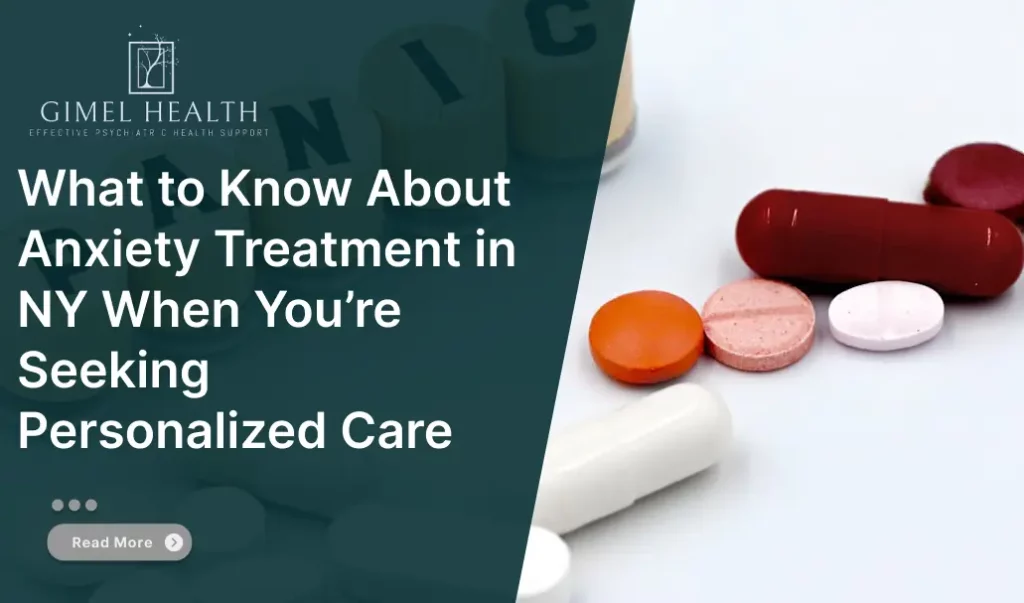
Anxiety is one of the most common mental...Read More

Resistant Depression isn’t a dead end—it’s a signal to take a more advanced, personalized approach. I design each treatment plan to meet your unique medical needs, whether you’re managing major depressive disorder, bipolar disorder, unipolar depression, or coexisting conditions like anxiety disorders, Substance Use Disorders, or chronic pain. Every decision is grounded in current clinical trials, systematic review data, and research from trusted sources like the National Institute of Mental Health, ensuring that even treatment-resistant cases receive the most effective treatment available today.
From cutting-edge solutions like repetitive transcranial magnetic stimulation, electroconvulsive therapy, deep brain stimulation, and vagus nerve stimulation, to innovative interventions like intranasal esketamine and augmentation therapy with atypical antipsychotics, I explore every viable path. I also consider traditional and different classes of antidepressants such as tricyclic antidepressants, selective serotonin reuptake inhibitors, and serotonin-norepinephrine reuptake inhibitors—adjusting medication when side effects like weight gain, cognitive impairment, or other adverse effects emerge.
By integrating cognitive behavioral therapy, talk therapy, and meaningful support group participation, we address emotional resilience and long-term stabilization. Whether you’re a young adult navigating risk factors or someone coping with chronic depression, my approach blends medical science, behavioral insights, and compassionate care. With consistent monitoring of remission rate, suicidal ideation, and clinical response, I help you move beyond survival toward reclaiming control over your daily life—restoring functionality, hope, and wellness through tailored care.
If you’ve tried multiple antidepressant medications or combinations—like SSRIs, SNRIs, tricyclic antidepressants, or monoamine oxidase inhibitors—without relief, you may be facing Resistant Depression, also known as refractory depression. I use clinical practice guidelines, JAMA Psychiatry insights, and systematic reviews to define it as depressive symptoms persisting after an adequate trial of at least two distinct classes of standard treatments. Evaluation covers your medical conditions, mood disorders, bipolar disorder, anxiety disorders, or chronic pain to build a more effective treatment plan. I also assess for risk factors like substance use disorders, borderline personality disorder, and cognitive impairment to ensure the treatment plan addresses every possible contributor.
When traditional options fail, I offer cutting-edge strategies, including electroconvulsive therapy, repetitive transcranial magnetic stimulation, deep brain stimulation, or vagus nerve stimulation—all backed by clinical evidence. Intranasal esketamine (a ketamine-based nasal spray) is available for rapid benefits. I also consider augmentation therapy with atypical antipsychotics or different antidepressants. Each approach is evaluated by clinical trials and resource information via the National Institute of Mental Health and other U.S. Drug Administration guidelines.
One of the most nicest, kindest and considerate doctors I met.
He went over with me thoroughly on the documents and was generous enough to explain me everything that I asked.
I think he is a real doctor of people and not just someone that’s write prescriptions.
I wanted to sincerely thank Dr Feldman for his help during my time in the U.S.
His support, especially when my country was under attack, flights were grounded and medication was hard to access, made a real difference.
He was very kind, professional, and helped me get exactly what I needed in the best and most thoughtful way.
Michael Feldman is an exceptional mental health provider who truly listens and takes time to understand patients’ concerns. He provides thoughtful guidance and support.
I met Michael Feldman after years of search and trial and error. If you look for a professional who is invested in his patient’s progress, research-oriented, with a deep understanding of the body-mind connection and a wholistic approach to treatment, look no further.
Dr Michael Feldman is an amazing doctor. He prescribed the proper medication in the right dosage for me. He did this because he listens and asks very good questions. I highly recommend him and his practice at Gimle Health.
Michael Feldman is a wonderful and caring P.A. He always gives 100%. He listens attentively and provides many insights I would never thought of by myself . I find having him in my corner invaluable and I could not recommend him more highly. He’s the best!
Michael is an amazing professional! He truly invests in his patients and provides care and feedback even during off hours. Although we have only been using his services for a short time, he already stands out as caring, knowledgeable, and confident in his approach. We plan to continue using his services and would absolutely recommend him to anyone!
Your journey to better mental health starts here. With advanced expertise in biology and psychiatry, I build exclusive medication plans backed by science. Contact me to schedule your initial consultation.
(201) 815-4351
440 West Str, Ste 307, Fort Lee Bergen County NJ 07024
Anxiety is one of the most common mental...Read More
Finding the right psychiatrist NJ is one of...Read More
Anger is a normal emotion, but when it...Read More
Premenstrual Dysphoric Disorder is a severe form of...Read More
Many mental health providers see patients who show...Read More
Medication management is one of the most effective...Read More
Resistant depression NJ, also known as treatment-resistant depression, is a form of major depressive disorder that does not improve after trying two or more antidepressant medications at the proper dosage and duration. It often includes persistent depressive symptoms, suicidal thoughts, or a partial response to therapy, despite consistent treatment. Individuals with refractory depression may also have underlying psychiatric disorders, such as anxiety disorders, substance use disorders, or even bipolar disorder, which can complicate treatment outcomes. Risk factors for resistant depression include chronic stress, medical conditions, and past trauma. Understanding the definition of treatment-resistant depression helps guide next steps in treatment.
Treatment options for resistant depression NJ extend beyond standard antidepressants. These may include switching to a different antidepressant or class, such as tricyclic antidepressants, monoamine oxidase inhibitors, or serotonin-norepinephrine reuptake inhibitors. Augmentation therapy using atypical antipsychotics, mood stabilizers, or antipsychotic medications may also be considered. For severe cases, brain stimulation therapies like electroconvulsive therapy (ECT), vagus nerve stimulation, or repetitive transcranial magnetic stimulation are effective treatment strategies. Intranasal esketamine, approved by the Drug Administration, offers fast-acting relief for some. Talk therapy, support group involvement, and ongoing lifestyle modifications, including proper sleep hygiene and exercise, are also vital components of treatment.
A diagnosis of treatment-resistant depression NJ is typically made when a person fails to achieve a clinical response to at least two adequate trials of different antidepressant medications. A healthcare provider will evaluate the individual’s treatment history, dosage adherence, and symptom timeline to rule out poor medication absorption or drug interactions. Diagnostic criteria also take into account the severity and duration of depressive symptoms, as well as co-occurring disorders like borderline personality disorder or post-traumatic stress disorder. Cognitive impairment, sleep problems, and functional decline in daily life are often indicators of inadequate response to traditional therapies.
Brain stimulation therapies, including electroconvulsive therapy, deep brain stimulation, and repetitive transcranial magnetic stimulation, are generally safe when administered in a clinical setting under medical supervision. These therapies are considered especially beneficial for people who have not responded to antidepressant medications or psychotherapy. Side effects are usually short-term and manageable. These interventions use controlled electrical current or magnetic field pulses to regulate nerve cell activity in the brain, which can help relieve depressive symptoms in those with severe depression or chronic depression. JAMA Psychiatry and other peer-reviewed journals have reported positive remission rates from these procedures.
Yes, resistant depression NJ can impact young adults uniquely due to overlapping developmental, academic, and social challenges. Many young adults experience symptoms earlier in life, often misdiagnosed or undertreated, which can evolve into chronic depression or treatment-resistant forms. Higher rates of comorbid mental health conditions—such as attention deficit hyperactivity disorder (ADHD) or generalized anxiety disorder—can make treatment more complex. Behavioral health support, access to clinical trials, and involvement in supportive online communities can improve outcomes. The National Institute and the Department of Psychiatry emphasize early intervention and tailored care for this age group.
Switching antidepressants or transitioning to a different class—such as moving from SSRIs to monoamine oxidase inhibitors or atypical antipsychotics—can pose risks, including withdrawal symptoms, serotonin syndrome, or adverse effects like weight gain or sexual dysfunction. However, in clinical practice, this approach can significantly increase the likelihood of finding an effective treatment. Each medication change is guided by clinical response, past antidepressant trials, and tolerance history, and monitored closely to minimize complications. Treatment Centers often use systematic review data to determine the best course for patients with chronic or unipolar depression.
Yes. Psychotherapy, especially cognitive behavioral therapy, remains an essential component of care for individuals with resistant depression. Even when antidepressant therapy alone has failed, combining it with talk therapy can help reduce symptoms, improve emotional regulation, and restore a sense of hope and purpose. Therapists often address underlying psychiatric disorders, family dynamics, and unresolved trauma, providing an outlet that medication alone cannot. Incorporating strategies from behavioral sciences and support group activities further improves treatment outcomes and builds long-term coping mechanisms.
Treatment-resistant depression NJ, also known as refractory depression, is typically defined as major depressive disorder that does not respond to at least two adequate trials of different classes of antidepressant medications. These may include selective serotonin reuptake inhibitors (SSRIs), serotonin-norepinephrine reuptake inhibitors (SNRIs), tricyclic antidepressants, or monoamine oxidase inhibitors. In clinical practice, I assess treatment resistance based on duration, dosage, response rates, and any co-occurring psychiatric disorders such as anxiety disorders or substance use disorders. Identifying this condition early allows for timely intervention with advanced treatment strategies.
Yes, brain stimulation therapies like electroconvulsive therapy, repetitive transcranial magnetic stimulation (rTMS), deep brain stimulation, and vagus nerve stimulation have shown strong results in cases of resistant depression. These treatments work by targeting nerve cells and altering activity in brain areas associated with mood regulation. They’re especially helpful when there is cognitive impairment, chronic stress, or an inadequate response to antidepressant trials. I tailor these therapies based on clinical response, remission rate, and guidelines from leading institutions like the Department of Psychiatry and National Institute of Mental Health.
We use cookies to improve your experience on our site. By using our site, you consent to cookies.
Manage your cookie preferences below:
Essential cookies enable basic functions and are necessary for the proper function of the website.
These cookies are needed for adding comments on this website.
Google reCAPTCHA helps protect websites from spam and abuse by verifying user interactions through challenges.
Google Tag Manager simplifies the management of marketing tags on your website without code changes.
Statistics cookies collect information anonymously. This information helps us understand how visitors use our website.
Vimeo is a video hosting platform for high-quality content, ideal for creators and businesses to showcase their work.
Service URL: vimeo.com (opens in a new window)
You can find more information in our Cookie Policy and Privacy Policy.